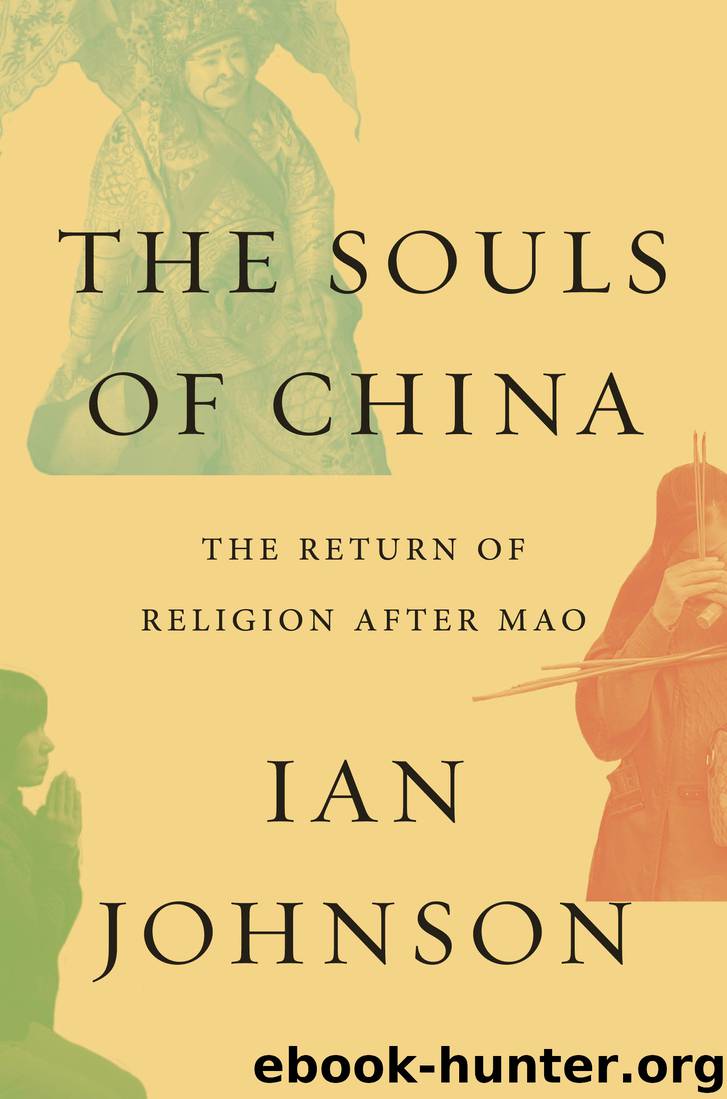The Souls of China by Ian Johnson

Author:Ian Johnson
Language: eng
Format: epub
Publisher: Knopf Doubleday Publishing Group
Published: 2017-04-10T16:00:00+00:00
I always found this part of the meditation slightly dubious. We were to focus on something we wanted and pull it into us, making it our own. Of course, it could be a good thing, but there were no instructions about this. What if it were something selfish, or evil? What if this tradition were linked to political power?
—
When I first went to China in 1984, one of my favorite places to visit was the White Cloud Temple, one of the oldest and quietest temples in the city. Located in the western part of the city, it was usually empty, except for the odd Daoist walking by in a blue gown and black cap over a topknot. During the first decades of Communist rule, the temple’s size had shrunk considerably. Halls were torn down or expropriated for other use. The neighborhood was gutted, including an enormous temple to Zhenwu, a warrior god in the Daoist pantheon. By the early 1980s, White Cloud Temple was surrounded by Communist-era housing and a belching power plant. But it remained a noble and ancient structure, dating back nearly a thousand years.
Over the years, the temple began to recover its original size. After the debacle of the Cultural Revolution and the start of economic reforms, the Chinese government was weak and had little money. But starting in the 1990s, the state began to rebuild its power. It boosted tax revenues and began to invest in government services, improving health care, professionalizing the police force, and raising the pay of civil servants. It more effectively monitored dissent, and built itself palaces to run the land. These were not as grand as the Great Hall of the People, but in almost every town they were the best buildings: tall, mirrored structures surrounded by gardens and hidden behind high walls and accordion-style barriers. These were gated communities of power, remote places off-limits to the public. People used to explain this with an ironic statement: “The Communist Party is now rich!”
The five official religions began to benefit from this government largesse too. The White Cloud Temple reclaimed some of China’s traditional medical heritage by opening a clinic in a newly refurbished wing of the temple. It built a new school to train Daoists in the ways of officialdom: how to balance a temple’s books, set up a website, apply for government funding, and efficiently monitor the Daoist priests in their district. The Chinese Daoist Association, which is headquartered in White Cloud Temple, also invested in real estate, including a shopping strip across the street from its main entrance. And many Daoist practices began to benefit from the government’s support of “intangible cultural heritage,” such as the Li family’s rural music. The government even began promoting Daoist ideas among bureaucrats.
But Daoism still retained an aura of being less controllable and more magical. Glimpses of this could be seen across the street from the White Cloud Temple in a storefront bookstore. It was just a few blocks from Qin Ling’s apartment, and after we got out for the evening I used to go see if it had any material on internal alchemy.
Download
This site does not store any files on its server. We only index and link to content provided by other sites. Please contact the content providers to delete copyright contents if any and email us, we'll remove relevant links or contents immediately.
| Buddhism | Christianity |
| Ethnic & Tribal | General |
| Hinduism | Islam |
| Judaism | New Age, Mythology & Occult |
| Religion, Politics & State |
Cecilia; Or, Memoirs of an Heiress — Volume 1 by Fanny Burney(31333)
Cecilia; Or, Memoirs of an Heiress — Volume 3 by Fanny Burney(30934)
Cecilia; Or, Memoirs of an Heiress — Volume 2 by Fanny Burney(30889)
The Secret History by Donna Tartt(16624)
Sapiens: A Brief History of Humankind by Yuval Noah Harari(13053)
Leonardo da Vinci by Walter Isaacson(11903)
The Radium Girls by Kate Moore(10907)
Sapiens by Yuval Noah Harari(4537)
The Wind in My Hair by Masih Alinejad(4424)
How Democracies Die by Steven Levitsky & Daniel Ziblatt(4399)
Homo Deus: A Brief History of Tomorrow by Yuval Noah Harari(4279)
Endurance: Shackleton's Incredible Voyage by Alfred Lansing(3845)
The Silk Roads by Peter Frankopan(3760)
Man's Search for Meaning by Viktor Frankl(3634)
Millionaire: The Philanderer, Gambler, and Duelist Who Invented Modern Finance by Janet Gleeson(3569)
The Rape of Nanking by Iris Chang(3516)
Hitler in Los Angeles by Steven J. Ross(3437)
The Motorcycle Diaries by Ernesto Che Guevara(3333)
Joan of Arc by Mary Gordon(3259)
